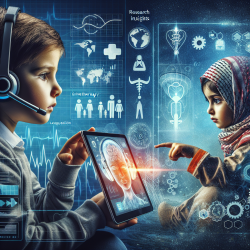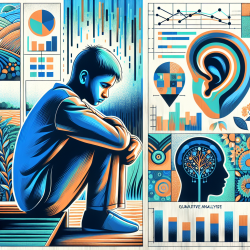Introduction
The ongoing Russia-Ukraine war has created a significant humanitarian crisis, impacting millions of lives. A recent study titled The human toll and humanitarian crisis of the Russia-Ukraine war: the first 162 days sheds light on the devastating effects of the conflict, particularly on healthcare infrastructure and public health. As practitioners in speech language pathology and online therapy, understanding these impacts can guide us in enhancing our services to better support children affected by such crises.
Understanding the Crisis
The research highlights the extensive damage to healthcare facilities and the disruption of essential services, which has led to increased health risks, including communicable diseases and mental health issues. These challenges are compounded for children, who are particularly vulnerable during conflicts. The study's findings underscore the importance of maintaining access to healthcare and support services, even in the midst of war.
Implications for Online Therapy
For practitioners providing online therapy services, such as those offered by TinyEYE, the research offers valuable insights into the needs of children in conflict zones. Here are key takeaways and strategies for improving our practice:
- Prioritize Mental Health: The trauma of war can have lasting effects on children's mental health. Online therapy can provide a safe space for children to express their feelings and receive psychological support.
- Adapt to Infrastructure Challenges: With disruptions to utilities and communication systems, it's crucial to develop flexible delivery models for therapy sessions. This may include asynchronous communication or low-bandwidth solutions.
- Focus on Continuity of Care: Ensuring that therapy services are consistent and reliable can help mitigate the instability children face in their daily lives. Building a strong rapport with children and their caregivers is essential.
- Collaborate with Local Resources: Partnering with local healthcare providers and NGOs can enhance the reach and effectiveness of online therapy services, ensuring that children receive comprehensive care.
Encouraging Further Research
The study also highlights the need for further research into the long-term impacts of war on children's health, particularly mental health. Practitioners are encouraged to contribute to this body of knowledge by documenting their experiences and outcomes in providing therapy to children in conflict zones. Such data can inform future interventions and policy decisions, ultimately improving the support available to affected populations.
Conclusion
As practitioners, our role is not only to provide immediate support but also to advocate for and contribute to the broader understanding of the needs of children in crisis. By leveraging research insights and adapting our practices, we can enhance the impact of our services and help build resilience in the children we serve.
To read the original research paper, please follow this link: The human toll and humanitarian crisis of the Russia-Ukraine war: the first 162 days.










